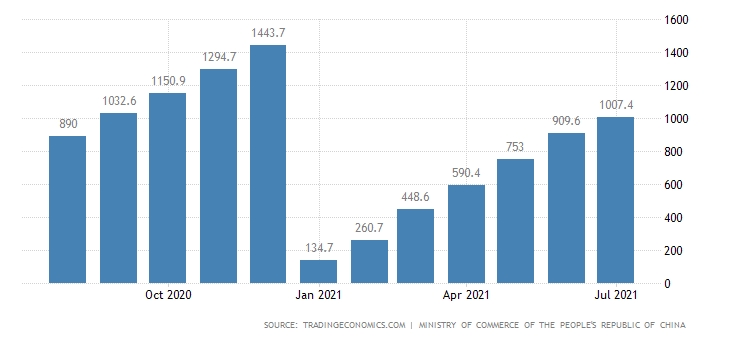Cathie Woods, founder of ARK Investment Management, appears to have made a U-turn in this regard. Ark’s exposure to Chinese stocks has fallen dramatically over the past few months. ARK’s flagship fund, ARK Innovation ETF (NYSE:ARKK), decreased its exposure from 8% to 1% since July. On record, she has noted that Chinese stocks needed a “valuation reset” as there is a disconnect between the price and risk.
In August, Woods revealed that that ARK has begun buying back into China, bigly. Tencent (OTC:TCEHY) (HK:0700), JD.com (NASDAQ:JD) (HK:9618) and Pinduoduo (NASDAQ:PDD) being some of her favourites.
Regulatory crackdowns in the country are still ongoing, but by in large, investment continues to flow into Chinese stocks, where opportunity persists.
The fabled Ant Group, one of China’s largest financial services providers, may still IPO.
Ant Group, founded by Alibaba's (NYSE:BABA) Jack Ma, has agreed to pair with several State-owned organisations in a joint venture. Participation in the joint venture is hoped to place Ant Group back in the Government’s good books and help revive its attempt to list on Beijing and Hong Kong stock exchanges.
Almost a year ago, Ant Groups IPO hopes were dashed in the first in an ongoing series of regulatory crackdowns. Regulators accused the Group of straying too far from its role as a financial services provider. The Group was asked to restructure as a banking entity. It may be true that Ant Group was acting outside their parameters as a payment service provider. However, it is widely believed that Jack Ma’s public criticism of the Chinese banking industry was the real indiscretion that caused regulators to apply pressure to the Group.
Ant Group could list before the end of 2021 if they play their cards right.
The latest industry to be put under the thumb of Chinese regulators; Gaming.
Last week, it was announced that persons under 18 could only engage in online video games from 8 pm to 9 pm on Friday, Saturday, and Sunday. I’m curious how this will be monitored, but I don’t doubt the authority’s ability to do so.
Authorities in China see the excessive time its 100 million youth spend playing video games threatening their education and home life. Estimates put average weekly gameplay at twelve and half hours. If accurate, the new policy will cancel 900 million hours of weekly gameplay.
In response, some of the top video makers’ shares dipped on the day of the announcement. However, In the past five days, the prices have inextricably increased. China’s Sohu.com (NASDAQ:SOHU) is up 5.58%, and Hong Kong’s NetEase (NASDAQ:NTES) (HK:9999) is up 6.55% since the regulatory news broke. It is possible these equities were under-priced, to begin with, and the regularity news bought this into view.

